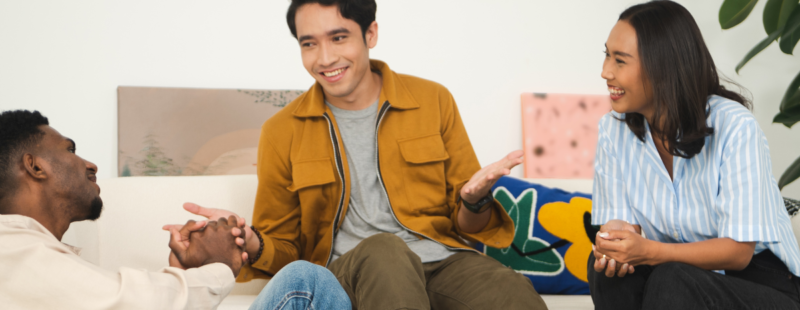Debs Gogarty from Open Door Warminster explains how the organisation was created.
How it all started
Open Door Warminster was conceived around a kitchen table at the start of the pandemic. Six people who didn’t know each other but were united by a desire to make a difference for anyone feeling isolated or excluded from the community.
Now, the pandemic clearly put isolation, and the associated loneliness that comes with it, front and square of everyone’s minds. But one of the six at that table was the social prescriber from our local GP surgery. She talked passionately about how loneliness was, and had been, endemic across all parts of our community for years. And how she believed people’s lives could be enriched simply by sitting and chatting with someone. The act of being seen, heard, and listened to – without judgement – was a powerful, life enhancing experience. And we had the power.
We resolved to set up a simple drop-in chat group and marvelled in slight disbelief as the Universe responded. Someone worked at a restaurant that only opened in the evenings. The owner happily said we could use it for free one morning a week. Someone else was closely connected to a church and knew several individuals who shared our belief in chatting as a therapeutic activity; they formed our first cohort of volunteers.
The local supermarket offered to provide us with free drinks, cakes and biscuits. We received free training in active listening from a local volunteer charity and got our first fundraising grant from Wiltshire Community Foundation; an independent charity tackling disadvantage and strengthening local communities by connecting people, information and resources. The precious funds enabled us to produce marketing materials, buy PPE (social distancing was very much in place) and draft a volunteers’ handbook, covering all the policies and procedures needed to safeguard our little band.
The first session
The first session was tentative, but every curious face at the window was enthusiastically welcomed. We met Malcolm and Pat who had just moved to the area and knew no-one. There was a small group of ladies from a nearby assisted living complex who just wanted to sit together and catch-up. But there were also people who struggled in the mainstream community, either because they had neurodiverse needs outside of the average – or sadly, because their way of life jarred with the values of their neighbours.
It was a salutary lesson for us all – how loneliness can spring from so many sources.
It became clear over the next few months, that cancer and bereavement were high on the list of causes – and people were coming to us because there was literally nowhere else to go locally. We decided to create two new groups focusing on these issues and, with the help of Macmillan Cancer and Dorothy House Hospice, we were able to set up these groups in our second year. Our volunteer cohort was enthusiastic about supporting these new ventures.
Like the very first social group – initial take-up on the new groups was tentative, but as word spread the numbers slowly increased. So much so that we eventually outgrew our space in the little restaurant and found a new home in a local community centre. Housed inside the fabric of a community theatre, the groups lost none of their ‘café’ feel – something the guests said was very important to them.
Responding to a simple, enduring need
Three years on and all three groups are running each week. The social group is a lively affair, often hosting 35-40 people. However, the lines between the groups are blurred and we frequently see people come depending on how they are feeling that day. One week they are happy and want to joke and laugh so they come to the social group. Then, they want to talk about the loss of someone dear, so visit the grief group.
Some of our guests from that very first session in October 2020 are still with us. Each week we welcome new faces and say goodbye to other: “I’m sorry I am just too busy these days,” said one guest who told us about the other clubs she had joined after gaining courage from coming to us.
The organising group is still six-strong, albeit with two new faces. We are currently organising another group session to run in the evening to support people occupied during the day. We are collaborating with other groups on activities such as improving transport and digital access.
We have grown so much now that we will be formally setting up as a CIO in 2024.
Three years ago, we gave ourselves a challenge: to respond to a simple enduring need – to feel connected, valued and a part of the community. When we look back at that first meeting and reflect on our achievements, we believe that anyone can make a positive impact in their community. You just need an idea, teamwork, a tiny bit of magic and buckets of resolve.




No comments on this article yet. Please feel free to submit a comment below.
By submitting a comment you grant Campaign to End Loneliness a perpetual license to reproduce your words and name/web site in attribution. Inappropriate and irrelevant comments will be removed at an admin's discretion. Your email is used for verification purposes only, it will never be shared.